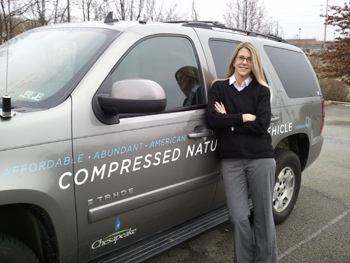 It’s not often that an English major lands–or for that matter, loves–a position at a major energy company. Yet such is the case with Stacey Brodak, who serves as Director of Corporate Development at Chesapeake Energy Corporation.
It’s not often that an English major lands–or for that matter, loves–a position at a major energy company. Yet such is the case with Stacey Brodak, who serves as Director of Corporate Development at Chesapeake Energy Corporation.
And as one of the faces of a company that’s the second largest producer of natural gas and the most active driller of new wells in the United States, some of those English courses have come in handy.
The star student and self-described “tomboy” first considered being a pharmacist before switching over to liberal arts at West Virginia University . “English gave me a great foundation in communications, and really taught me how to be an effective writer,” she says.
It also gave her the skills to become the executive director at the Greater Morgantown Convention and Visitors Bureau and then the senior director of donor relations at the West Virginia University Foundation. Still, Brodak was restless: “I was ready for the next step,” she says.
INTO THE ENERGY FIELD: In 2007, Brodak was recruited to her current position, which she remembers being touted as a “wonderful opportunity to learn about energy and to relate to the public.”
It was also an opportunity for Brodak–who hails from the tiny borough of Carmichaels in Greene County–to work in her native state, this time to the Washington County borough of Canonsburg.
“There was a big learning curve there,” she recalls. Making the transition even more of a challenge was the fact that the Marcellus Shale development was starting to make headlines. Chesapeake–the largest leasehold owner in the Marcellus Shale–needed people like Brodak more than ever.
THE FACE (AND HEART) OF THE CORPORATION: Though the title Director of Corporate Development may sound austere, Brodak’s work is anything but. For many Pennsylvanians, she a real and reassuring voice that represents a major, and sometimes controversial, initiative.
“I spend time with landowners and public groups, educating them and helping them become comfortable with Chesapeake’s activities in the Marcellus Shale,” she says. She travels all over the state, meeting with people in their backyard patios or their local fire halls. Though Brodak sometimes meets resistance, she reports that presenting the facts in a calm, caring way almost always works.
“There’s a lot of misinformation out there,” she says. “That’s why it’s important for me to speak with people in the Marcellus Shale region one-by-one.” At every meeting, she talks about Chesapeake’s best management practices that she says go above and beyond industry requirements. “It may cost more, but it’s the right thing for the environment and for these communities,” she says.
For starters, Chesapeake practices closed-loop drilling, a practice that allows drilling to occur without creating pits that house waste products. Then there’s the company’s Aqua Renew (TM) Program, a technology that allows a wellsite to filter and reuse the water consumed during the fracturing process. Today, almost four million gallons of water are reused each month in Marcellus Shale fracturing operations through the Aqua Renew Program. “We were early to implement this tremendous technology, which virtually eliminates the waste water disposal issues,” Brodak says.
Brodak also fields many questions about the chemicals used in the Marcellus Shale Fracturing Fluid Makeup. To answer them, she tells people that 0.5 percent of the makeup derives from chemical additives (water and sand comprise the other 99.5 percent) and that every chemical is listed on www.askchesapeake.com, a website for anyone who has an interest in or questions about the company’s natural gas operations.
THE NATURAL WAY FORWARD: For her part, Brodak sees huge potential in natural gas. “It’s affordable, abundant, the cleanest burning hydro on the planet, and American,” she enthuses. That final benefit–which Brodak says many people fail to remember–could do wonders for Pennsylvania’s economy.
In addition to sponsoring natural gas-fueled trucking fleets, Chesapeake lets her zip around to appointments in a company car that runs entirely on natural gas. She loves commandeering a vehicle whose fuel burns 70 percent cleaner and costs 40 percent less than conventional gasoline, and laments the fact that there are so few natural gas cars and fueling stations around. “We could run cars on natural gas,” she says.
In addition to spending time with her family and renovating her home, Brodak enjoys photography. And one of her favorite subjects are rigs and the men and women who work on them. Lately, she’s been especially keen on snapping up photos the latter, envisioning a day when they–like her–will someday drive a car powered by the fuel they work so hard to extract from the earth.
Amanda Prischak is an Erie-based freelance writer. You can read more of her work here, or send feedback here.
Sign up here to receive Keystone Edge for free in your inbox every week.
